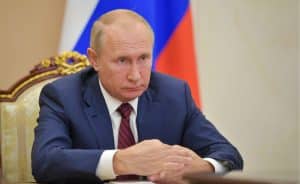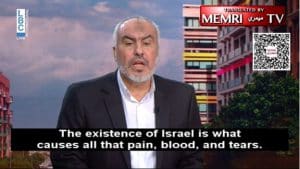Special project to mark one month to the Iron Swords War. Please see the attached PDF file.

Russian President Vladimir Putin, source: Aynur Mammadov shutterstock.com

Hamas spokesperson Ghazi Hamad in an interview where he denied Israel’s right to exist, called to its annihilation and said Hamas is committed to repeat massacres such as October 7, source: MEMRI.org – Middle East Media Research Institute
Russia has so far taken a problematic approach to the Israel-Hamas conflict that began with the systemic massacre rampage of Israeli citizens on October 7. This only adds to the already-complicated and pragmatic Israeli relations with Russia, which maintains good relations with the terror organization Hamas and supports an independent Palestinian state with “occupied East Jerusalem” as its capital. Israel for its part has avoided a direct condemnation of Russia’s invasion of Ukraine in February 2022 and refused supplying Ukraine with weapons as part of a larger strategy of keeping adequate relations with Moscow and maintaining Israeli-Russian coordination above the skies of Syria.
Russia has been under heavy criticism for hosting Hamas officials after the October 7 attack, after Hamas delegations including its most senior officials have been regular visitors to the Kremlin, meeting President Putin and Foreign Minister Lavrov. On October 26, a Hamas delegation headed by senior official Musaa’ Abu Marzuk visited Moscow and met the Russian Deputy Foreign Minister Mikhail Bogdanov, where Iranian Foreign Ministry senior official Ali Bagheri Kani was also present. Reportedly, they discussed the release of hostages held by Hamas who hold Russian citizenship.
The Israeli Foreign Ministry scolded Russia for this step, saying “Israel sees the invitation of senior Hamas officials to Moscow as an obscene step that gives support to terrorism and legitimizes the atrocities of Hamas terrorists,” and called on Moscow to immediately expel the Hamas leaders. On October 29, the Israeli Foreign Ministry summoned the Russian Ambassador to Israel Anatoly Viktorov to complain about Russia’s attitude towards the Israel-Hamas war and the welcoming of a senior Hamas delegation in Moscow. Reportedly, he was told Israel takes a “serious view” of Moscow not issuing a clear and unequivocal condemnation of Hamas, as well as of Russia’s conduct in international bodies.
Moscow did not openly condemn the violence inflicted on Israel by the Palestinian terrorist group Hamas, which is backed by its ally Iran, but instead appeared to initially alienate its Israeli partners. Instead of open condemnation, the Russian Foreign Ministry called on all sides to renounce violence, exercise restraint and implement a cease-fire, warning of a potential highly dangerous escalation. In a delayed statement Moscow then affirmed Israel’s right to defend itself after Hamas’s attack, but denounced Israel for responding with “cruel methods”. “In my view it is unacceptable,” Putin said on October 10 of Israel’s air campaign in Gaza. “More than 2 million people live there [in Gaza]. Far from all of them support Hamas.” The Kremlin said in a statement that “deep concern was expressed about the continuing escalation of violence and the catastrophic increase in the number of civilian casualties.” Criticism was voiced against Russia for scolding Israel for its self-defense while indiscriminately targeting civilians in Ukraine.
On October the 19th, Russia announced it had sent 27 tons of humanitarian aid to Gaza to be transported via Egypt following the reported Al Ahli Al Arab Hospital explosion for which Israel was widely blamed, yet turned out to be the result of a misfired PIJ rocket. Putin called the “strike on the hospital a “catastrophe” and pressed for urgent negotiations.
In his first public statement on the crisis on October 10, the Russian president accused the United States of playing a “destructive” role saying that the conflict is a “vivid example” of Washington’s failed policy. On Tuesday the 10th, Putin said the eruption of violence between Israel and the Palestinians showed that US policy had failed in the Middle East and had taken no account of the needs of the Palestinians. “[They] tried to monopolize regulating [the conflict], but were unfortunately unconcerned with finding compromises acceptable for both sides,” Putin said, according to the Moscow Times. US President Biden has meanwhile warned Iran to be “careful” not to escalate the conflict. As whilst the US has not directly blamed Iran for involvement in Hamas’s attack, it has said Tehran is “broadly complicit” due to its longtime backing of the Palestinian group. Iran celebrated the Hamas assault but insisted it was not directly involved.
Russia’s interests in the war: Distraction from Ukraine, regional spillover, oil prices
Russia may view the Israel-Gaza conflict as a welcome distraction from the war with Ukraine. The timing could not be better for Russia in some respects, as there is an increasing sense that public support for continued funding for Ukraine, and overall patience with the 19-month war, is declining. “This conflict is a boon for Russia because it diverts a huge amount of attention from the United States and the West. There was also a sense of glee in Moscow over Israeli military and intelligence failures, which were presented as a testament of western weakness,” said Andrei Soldatov, an expert on Russia’s security services, and added such sentiments “unmasked the acute psychological trauma suffered by the Russian military after its disastrous offensive against Ukraine in the early months of 2022.”
Russian Foreign Minister Sergey Lavrov has warned that the conflict in Gaza risks spilling into a regional crisis. On October 18, Russia proposed amendments to a draft UN resolution that would have called for an “immediate full” ceasefire and an end of attacks on civilians, but this was rejected by the UN Security Council. The final draft, which called only for humanitarian pauses, was vetoed by the US while Russia abstained.
Escalation in the Middle East could pose a major challenge for Russia with its vested interests in Syria, Iraq and Iran, particularly on the defensive level. Risking Russia’s ally Iran and its interests around the region could trigger Russia into action, especially as it is heavily invested in Iran, with Iranian suicide drones attacking Ukrainian cities and its civilian infrastructure, and Iranian ground-to-ground missiles boosting the Russian military effort in Ukraine. The US, meanwhile, warns that Iran seeks to acquire large numbers of Russian attack helicopters, warplanes and air defense systems.
Russia could be dragged into a potentially extreme wider conflict that sees its influence, interests and assets damaged in the Middle East. Since the Russian Foreign Ministry’s initial statements, the conflict has dramatically escalated thus increasing the likelihood that neighboring Lebanon, Syria and Iran could enter the theater of war, too. Russia has already engaged with Lebanon on how to prevent a spillover of the conflict and the opening of a second front. They have also talked to Iraq, with the Iraqi Prime Minister visiting Russia, and they have tied that to OPEC+ cooperation. Russia has also engaged with Turkey on the issue of Palestinian civilians, and with Egypt on a ceasefire.
Russia also stands to benefit from a rise in crude prices amid instability in the Middle East, given that the conflict has the potential to draw in neighboring territories. Oil prices jumped 4% on Monday, October 9th following Hamas’ surprise attack but prices have since stabilized somewhat. Increased crude prices help Moscow to bolster its reserves especially given the fact that it relies more heavily on oil export revenues following its economic isolation after the Ukraine invasion and even more so as it plans a huge defense spending boost in 2024. Higher oil prices are beneficial for the Russian economy, and as a result, for the Russian defense budget which will reach 6% of its GDP in 2024.
Relations with all concerned actors
Until the current crisis, Russia had recently enjoyed reasonable relations with Israel and good relations with a number of countries in the Middle East. It could potentially use those relationships to act as a mediator in the conflict, if necessary, as Israeli forces fight Iran-backed Hamas extremists. For years, Putin has sought to cultivate strong ties with Israel while also backing the Palestinian cause, a stance which originates in the Soviet era. Putin has over the years maintained close ties with Israeli Prime Minister Benjamin Netanyahu despite foreign policy clashes between the two states, including over the war in Syria. Pinchas Goldschmidt, who served as the chief rabbi of Moscow for nearly 30 years until fleeing the country over his opposition to the Ukraine war this week said “Israel has always been careful to maintain a good relationship with Moscow given Russia’s large Jewish community and its influence over Syria.”
As such, the war between Israel and Hamas provides Russia with an opportunity to further act as a diplomatic player in the region. But after the worst attack on Israel in decades, the long-standing friendship seems to currently be facing serious challenges.
